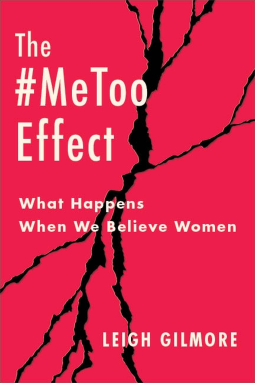“The #MeToo Effect” by Leigh Gilmore is insightful, eye-opening, and brutal. As is sadly the case with books like these, I anticipate the problem being wide-scale and deeply rooted, and yet, still, it is worse than I thought. The road to justice for and protection of sexual abuse survivors is still a long one. We have a lot of work to do but that doesn’t mean we haven’t made huge progress in getting here.
The pattern persists because the racist and sexist associations required to reproduce it are entangled in processes that are enshrined as positive and fair. For this reason, our first thoughts about justice and protection are often for abusers rather than survivors.
The book is broken into two parts. The first looks at narrative activism, how it has shaped and changed our conversations and the effect survivor testimony has had. It unpacks the shift from the individual saying something to a collective witness; it takes a close look at the people who spoke up and out about sexual trauma; and the historical context in which this revolution takes place.
This book diagnoses why this is so difficult and how narrative activism makes it less so. It shifts the focus from demanding that survivors speak out to the features of narrative and reception that enable us to hear them.
The second looks at the impact of the revolution on justice, how the storytelling has shaped consent and what survivors need from us going forward.
Abusers retain positions of influence because they are often more aligned with institutional norms than are those who complain. Abuse is supported by processes that punish those who speak out, shield abusers from repercussions, and allow willing enablers and passive bystanders to thrive.
I highly recommend reading this book to be challenged, to deepen one’s understanding, and to be inspired to do more. It’s a five out of five on the enJOYment scale.
…but for a yes to be meaningful, we must be able to say no.
I received a complimentary copy of the book from Columbia University Press through NetGalley. Opinions expressed in this review are completely my own.

From the back cover:
The #MeToo movement inspired millions to testify to the widespread experience of sexual violence. More broadly, it shifted the deeply ingrained response to women’s accounts of sexual violence from doubting all of them to believing some of them. What changed?
Leigh Gilmore provides a new account of #MeToo that reveals how storytelling by survivors propelled the call for sexual justice beyond courts and high-profile cases. At a time when the cultural conversation was fixated on appeals to legal and bureaucratic systems, narrative activism—storytelling in the service of social change—elevated survivors as authorities. Their testimony fused credibility and accountability into the #MeToo effect: uniting millions of separate accounts into an existential demand for sexual justice and the right to be heard.
Gilmore reframes #MeToo as a breakthrough moment within a longer history of feminist thought and activism. She analyzes the centrality of autobiographical storytelling in intersectional and antirape activism and traces how literary representations of sexual violence dating from antiquity intertwine with cultural notions of doubt, obligation, and agency. By focusing on the intersectional prehistory of #MeToo, Gilmore sheds light on how survivors have used narrative to frame sexual violence as an urgent problem requiring structural solutions in diverse global contexts. Considering the roles of literature and literary criticism in movements for social change, The #MeToo Effect demonstrates how “reading like a survivor” provides resources for activism.

